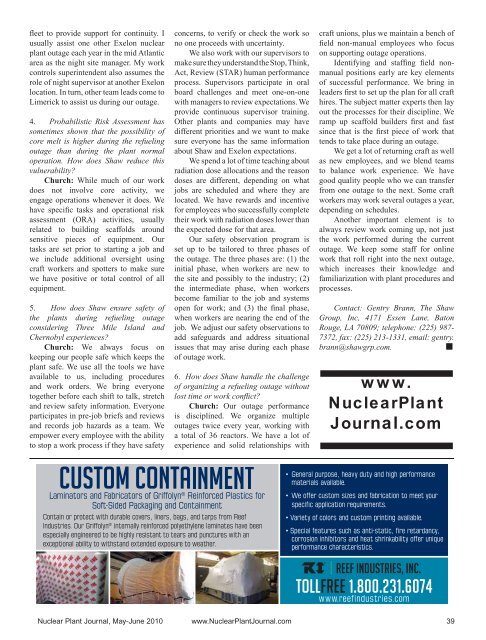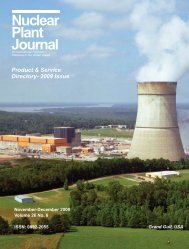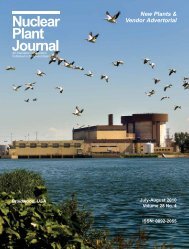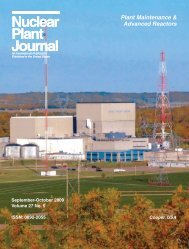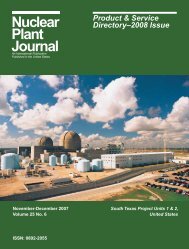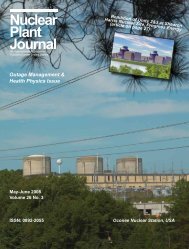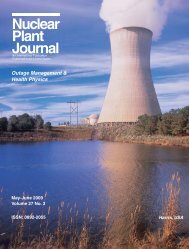New Energy - Digital Versions - Nuclear Plant Journal
New Energy - Digital Versions - Nuclear Plant Journal
New Energy - Digital Versions - Nuclear Plant Journal
Create successful ePaper yourself
Turn your PDF publications into a flip-book with our unique Google optimized e-Paper software.
fleet to provide support for continuity. I<br />
usually assist one other Exelon nuclear<br />
plant outage each year in the mid Atlantic<br />
area as the night site manager. My work<br />
controls superintendent also assumes the<br />
role of night supervisor at another Exelon<br />
location. In turn, other team leads come to<br />
Limerick to assist us during our outage.<br />
4. Probabilistic Risk Assessment has<br />
sometimes shown that the possibility of<br />
core melt is higher during the refueling<br />
outage than during the plant normal<br />
operation. How does Shaw reduce this<br />
vulnerability?<br />
Church: While much of our work<br />
does not involve core activity, we<br />
engage operations whenever it does. We<br />
have specific tasks and operational risk<br />
assessment (ORA) activities, usually<br />
related to building scaffolds around<br />
sensitive pieces of equipment. Our<br />
tasks are set prior to starting a job and<br />
we include additional oversight using<br />
craft workers and spotters to make sure<br />
we have positive or total control of all<br />
equipment.<br />
5. How does Shaw ensure safety of<br />
the plants during refueling outage<br />
considering Three Mile Island and<br />
Chernobyl experiences?<br />
Church: We always focus on<br />
keeping our people safe which keeps the<br />
plant safe. We use all the tools we have<br />
available to us, including procedures<br />
and work orders. We bring everyone<br />
together before each shift to talk, stretch<br />
and review safety information. Everyone<br />
participates in pre-job briefs and reviews<br />
and records job hazards as a team. We<br />
empower every employee with the ability<br />
to stop a work process if they have safety<br />
concerns, to verify or check the work so<br />
no one proceeds with uncertainty.<br />
We also work with our supervisors to<br />
make sure they understand the Stop, Think,<br />
Act, Review (STAR) human performance<br />
process. Supervisors participate in oral<br />
board challenges and meet one-on-one<br />
with managers to review expectations. We<br />
provide continuous supervisor training.<br />
Other plants and companies may have<br />
different priorities and we want to make<br />
sure everyone has the same information<br />
about Shaw and Exelon expectations.<br />
We spend a lot of time teaching about<br />
radiation dose allocations and the reason<br />
doses are different, depending on what<br />
jobs are scheduled and where they are<br />
located. We have rewards and incentive<br />
for employees who successfully complete<br />
their work with radiation doses lower than<br />
the expected dose for that area.<br />
Our safety observation program is<br />
set up to be tailored to three phases of<br />
the outage. The three phases are: (1) the<br />
initial phase, when workers are new to<br />
the site and possibly to the industry; (2)<br />
the intermediate phase, when workers<br />
become familiar to the job and systems<br />
open for work; and (3) the final phase,<br />
when workers are nearing the end of the<br />
job. We adjust our safety observations to<br />
add safeguards and address situational<br />
issues that may arise during each phase<br />
of outage work.<br />
6. How does Shaw handle the challenge<br />
of organizing a refueling outage without<br />
lost time or work confl ict?<br />
Church: Our outage performance<br />
is disciplined. We organize multiple<br />
outages twice every year, working with<br />
a total of 36 reactors. We have a lot of<br />
experience and solid relationships with<br />
craft unions, plus we maintain a bench of<br />
field non-manual employees who focus<br />
on supporting outage operations.<br />
Identifying and staffing field nonmanual<br />
positions early are key elements<br />
of successful performance. We bring in<br />
leaders first to set up the plan for all craft<br />
hires. The subject matter experts then lay<br />
out the processes for their discipline. We<br />
ramp up scaffold builders first and fast<br />
since that is the first piece of work that<br />
tends to take place during an outage.<br />
We get a lot of returning craft as well<br />
as new employees, and we blend teams<br />
to balance work experience. We have<br />
good quality people who we can transfer<br />
from one outage to the next. Some craft<br />
workers may work several outages a year,<br />
depending on schedules.<br />
Another important element is to<br />
always review work coming up, not just<br />
the work performed during the current<br />
outage. We keep some staff for online<br />
work that roll right into the next outage,<br />
which increases their knowledge and<br />
familiarization with plant procedures and<br />
processes.<br />
Contact: Gentry Brann, The Shaw<br />
Group, Inc, 4171 Essen Lane, Baton<br />
Rouge, LA 70809; telephone: (225) 987-<br />
7372, fax: (225) 213-1331, email: gentry.<br />
brann@shawgrp.com.<br />
<br />
www.<br />
<strong>Nuclear</strong><strong>Plant</strong><br />
<strong>Journal</strong>.com<br />
<strong>Nuclear</strong> <strong>Plant</strong> <strong>Journal</strong>, May-June 2010 www.<strong>Nuclear</strong><strong>Plant</strong><strong>Journal</strong>.com 39


